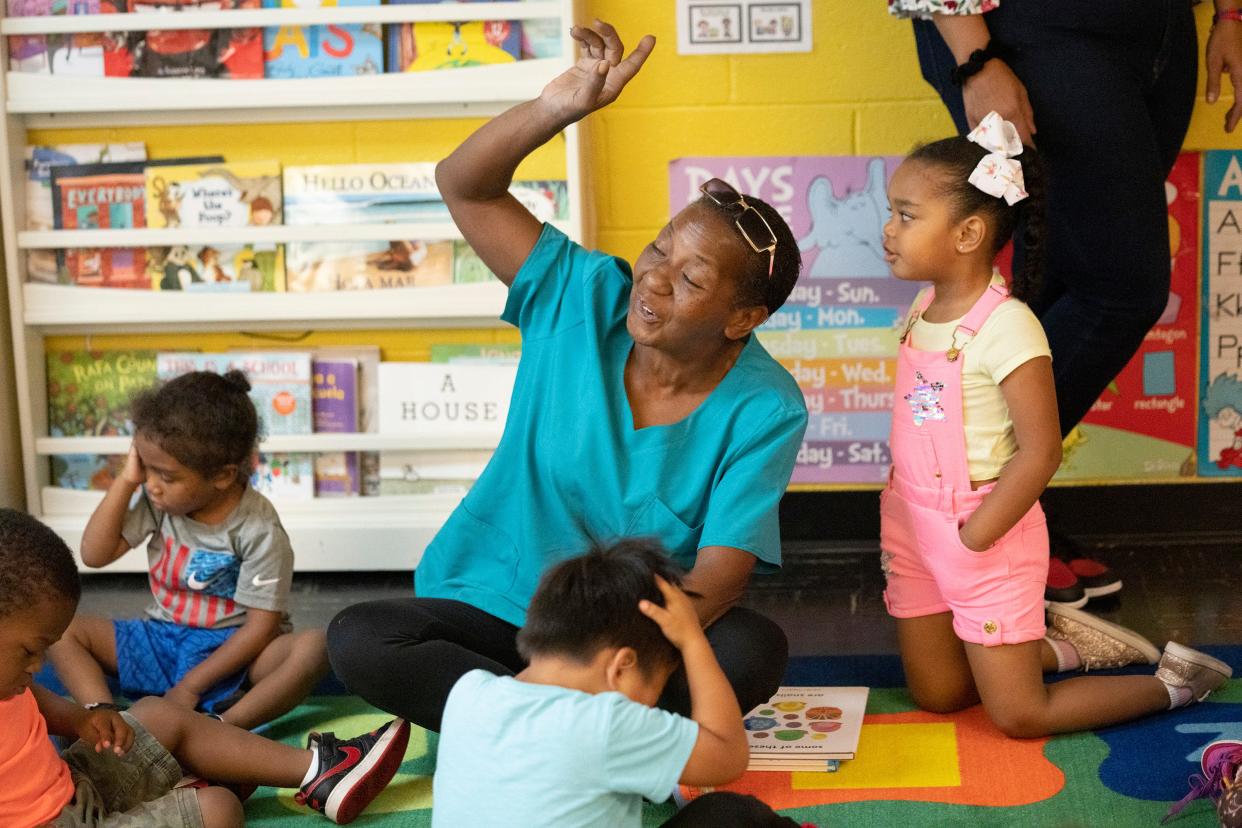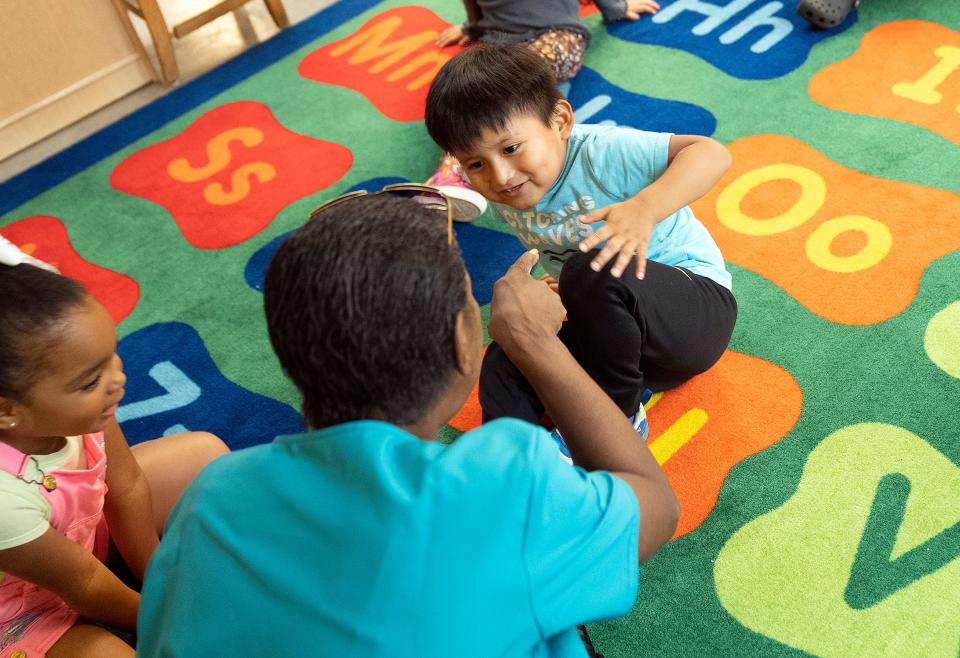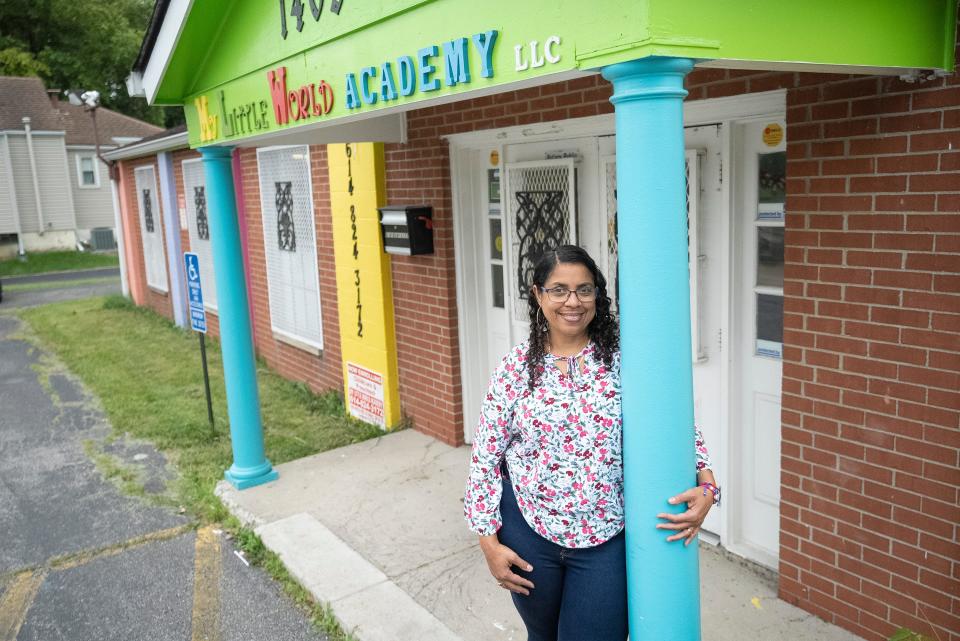Most Franklin County children aren't ready for kindergarten. What needs to change?

Cynthia Jones clapped her hands together, then onto the tops of her thighs, singing to the group of 3- and 4-year-olds sitting on the rug in front of her.
“Ha-and clap. Ha-and clap. Sitting in the classroom, playing a little game. When I point to you, please tell me your name,” she sang, her singing peppered with reminders for certain students to sit up, say their names and keep their hands off her friends.
Jones is the lead teacher in the pre-kindergarten classroom at My Little World Academy on the city’s South Side.
What she’s doing with the students — teaching them everything from counting to social skills — is some of the most important learning children will get in their lifetime, according to experts on early childhood education.
“Developments in brain science make it clear that the vast majority of growth and development occurs during a child’s youngest years,” said Jamie O’Leary, associate director of policy for the Crane Center for Early Childhood Research and Policy and the Schoenbaum Family Center at Ohio State University.
Despite that, the public education system doesn’t fund learning before 5 years old, when students typically enter kindergarten.
In Franklin County, 60% of children are not ready for kindergarten, said Mario Basora, CEO of Future Ready Five, a collaborative that works with different organizations in early childhood education to support families.
The statistics worsen for children of color, with 72% of Black children not ready for kindergarten and 82% of Latino kids not prepared, he said.
Franklin County funding: County investing $23 million to help families struggling to pay for child care
Half of the children in Franklin County don’t have access to early learning until age 5, he said, due in part to high costs of childcare.
“We believe that the house is on fire and we have to act now to make changes that will ultimately impact the future, not just in the long-term but in the short-term as well,” Basora said.
Basora wants a county levy to fund early childhood education, something many other counties and cities in the state and beyond already do.
Research shows that the learning that does or does not take place within the first five years of a child’s life can determine a lot about their futures. It is linked to factors including their achievement and learning through to high school graduation; likelihood that they will attend college; and the probability of whether or not they will be gainfully employed or engage in criminal activity as adults.
Some of this knowledge about the importance of early education is relatively new, O'Leary said, bringing increased calls for more funding for early childhood education, with advocates saying there needs to be more access for families, pay for teachers, and support for providers.
What is kindergarten readiness?
Children in public and community school programs are evaluated on kindergarten readiness at the beginning of the school year through Ohio’s Kindergarten Readiness Assessment. The assessment measures children based on state standards and determines if they have social foundations, mathematics, language, physical well-being and motor development skills.
“Rich early-learning experiences from birth to age 5 prepare children for kindergarten," O'Leary said. "Being kindergarten-ready means having skills in language and numeracy, but also social, emotional and self-regulation skills necessary to succeed in the classroom."
The learning experiences that matter for children can happen at home or in informal childcare environments as well as in learning centers, O’Leary said.
“There’s no best or right way to do that,” she said. “We do know that for children living in poverty and coming from disadvantage … this is even more critical because if you show up to kindergarten ‘behind,’ you’re already at a disadvantage, and that gap begins to grow wider.”
Public investment in free childcare and preschool can help offset the resource gap between children whose families live in poverty, or in crime-ridden communities, and those who don’t, O’Leary said.
Levies can help because, in communities like Columbus, where many families live in poverty, the state funding isn’t enough for centers to increase teacher pay. And quality teachers lead to quality early childhood education.
“We should pay for it now, but a lot of those figures and concepts have been around a long time, and it's not convinced enough policymakers to do something about it,” O'Leary said. “It's good for the economy, it's good for employers, it's good for families, it's good for children and it's the right thing to do."

A levy in Franklin County?
A levy for early childhood education could provide a certain dollar amount in funding for every family in the county, based on their need, Basora said.
And Franklin County could have one on the ballot as early as 2025, he said.
The county is already the biggest funder in the early childhood space locally, said Franklin County Commissioner Erica Crawley. The county believes it has a responsibility to solve the problem of a lack of children getting quality early learning as the “largest social safety net,” she said.
Children end up learning less over their lifetime depending on their family’s income, she said. As childcare centers closed during the pandemic, the commissioners realized that access to early childhood education and childcare was unstable. Commissioners introduced a $23 million investment in March 2022 called Franklin County RISE.
The money is being used to support daycare providers; offer families childcare scholarships; and give emergency rental assistance to child care workers, who are paid around $12 per hour.
As for a levy, Crawley said it's being considered, but that the county isn't prepared to have one this year or next year.
The county is also building it's own childcare center where a jail previously was Downtown, she said. Demolition will begin by the end of the year or early next year and finish within three years. A new structure will go up with 404 spots available to city and county employees, and some for the broader community, she said. It's too early to know the total cost, according to a county spokeswoman.
The city of Columbus opened up a $20 million childcare center, the Hilltop Early Learning Center, this summer with 240 spaces for children from families living below 300% of the federal poverty level.
Preschool Promise, Inc.
Dayton is one of the cities that already has public funding in the form of a city tax ballot initiative for early childhood education.
Preschool Promise Inc. is a nonprofit funded in part by Montgomery County and the tax ballot initiative, which was approved by voters in 2016, said executive director Robyn Lightcap.
It helps families access and pay for high-quality preschool and other resources for at-home learning; sends families a book each month in the mail that teachers also have; provides stipends for teachers to attend trainings; and helps preschool providers expand their offerings and capacity.
It also dedicates some of its funding to connect with families and help them understand the importance of preschool, Lightcap said.
“Our vision is that every child in Montgomery County is ready for kindergarten, and we are partnering with others to make early-learning opportunities available for children and their families,” she said.
Of the children who attend school at the 120 Preschool Promise affiliated sites, 36% are ready for kindergarten, compared to only 18% of all others, Lightcap said, referencing scores on the state’s kindergarten readiness assessment.
Public funding was key in that change, she said.
“The longer I do this work, it’s so obvious that if we invest in the beginning, everybody wins," Lightcap said. "The children will be more successful as they go on to school; we’ll spend less money on trying to catch them up later on; the teachers will be able to work with them more, and work on the more advanced skills.”

Local efforts
At My Little World Academy, director Kenia Brito has empty classrooms, about 40 children attending and a waiting list. She is hiring teachers, and said the center serves mostly low-income families.
It's a common story, Basora said, adding that he hears from child care centers that they have empty classrooms because they don't have the money to pay people enough to staff their centers.
"You have these centers with long waiting lists of kids that absolutely need to be served who aren't being served because we don't value, as a society, early education enough to put the necessary funds to support our kids," Basora said at a Columbus Metropolitan Club forum in June. "So, if we know that's the case and we know that's where we can really make an impact on kids, why aren't we realigning our resources right now?"
That’s where Future Ready Five can come in, Basora said.
Previously known as Future Ready Columbus, the organization wants to bring together local resources into one approach, as Basora said many people are working to improve early learning locally, but in silos.
Over the next several months, the organization is piloting a program through local learning centers and preschools.
It will include hiring a community health worker to work with a group of about 200 families to connect them to assessments of their child’s learning, and create a plan of action to address any gaps, while also helping the families with other needs.
Columbus officials: Hilltop kids have less 'quality' preschool programs than rest of city
The effort will start at centers Future Ready Five is partnering with in Linden, Groveport and Whitehall, Basora said, and slowly grow over time so it covers the whole county.
“I think it’s probably a 10-year endeavor,” he said.
Brito looks forward to the opportunity to work with a community health worker, as some of the families her center serves sometimes need help with getting diapers, food and more. Many of them are getting government assistance to pay for childcare, meaning their income is at or below 142% of the federal poverty level.
"We're here to help everyone," she said.
dking@dispatch.com
@DanaeKing
This article originally appeared on The Columbus Dispatch: Why over half of Franklin County children aren't kindergarten ready

